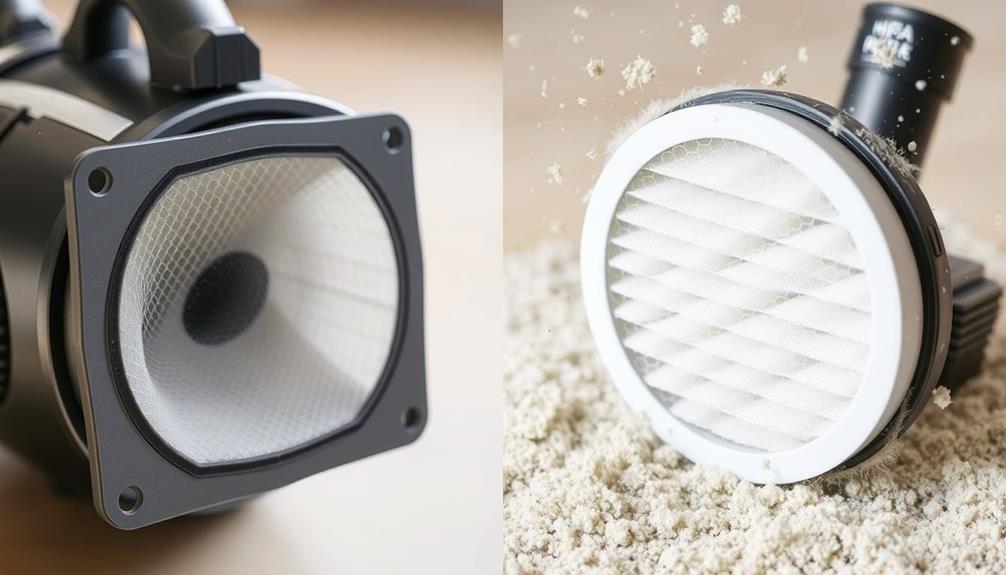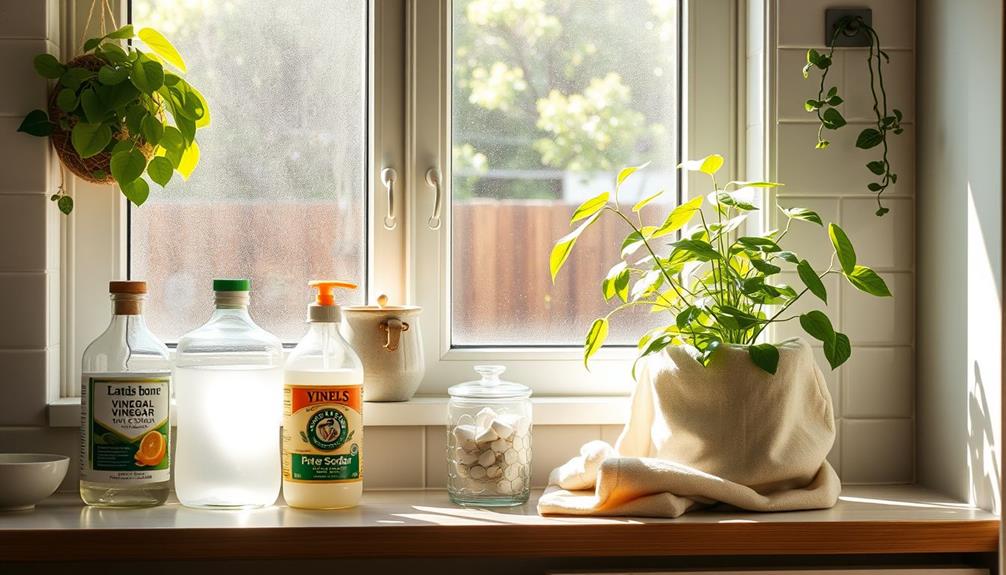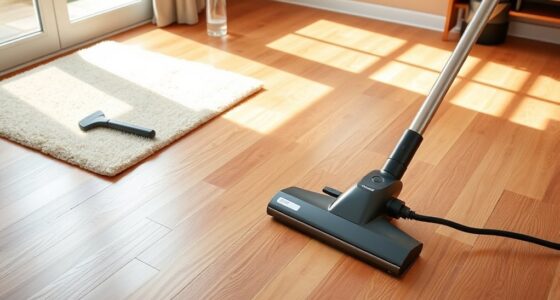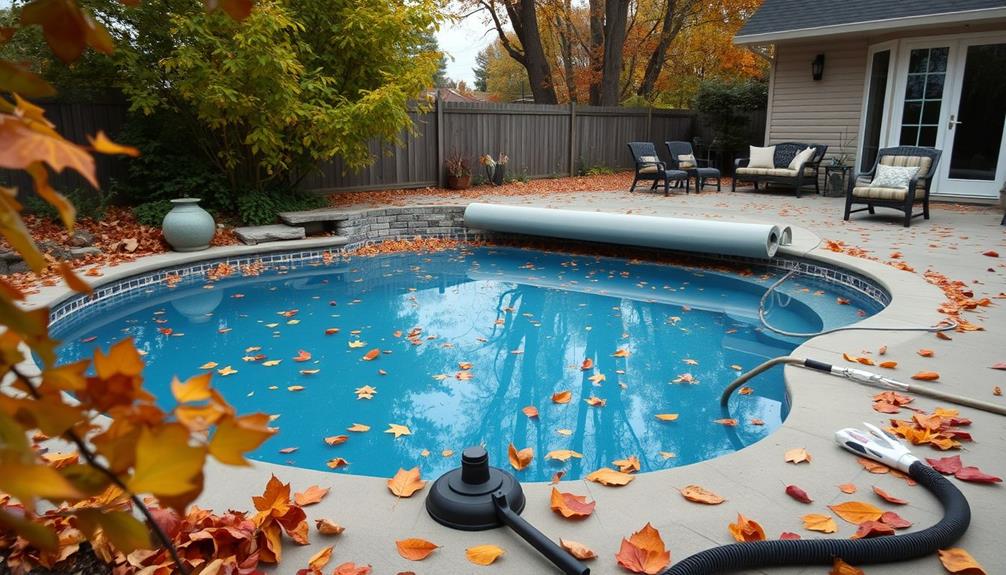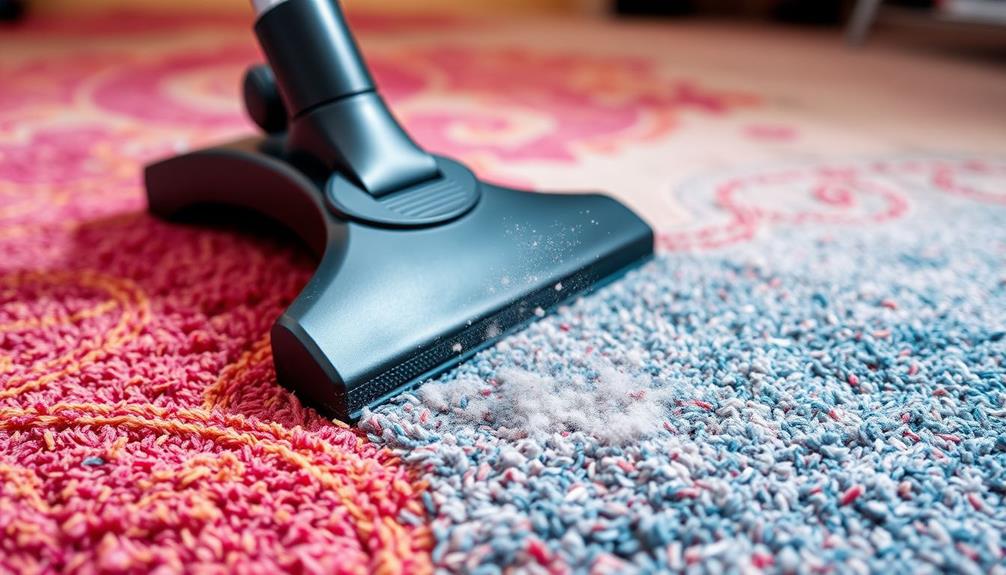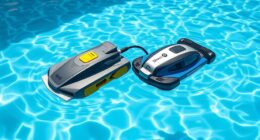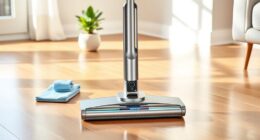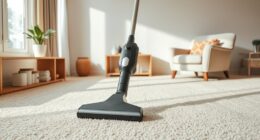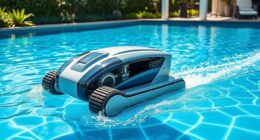When selecting a vacuum cleaner, it is essential to understand filtration systems. HEPA filters can capture 99.97% of particles as small as 0.3 microns, making them ideal for individuals with allergies. On the other hand, standard filters only trap 80-85% of particles, which may not be as effective in enhancing air quality. ULPA filters offer even greater efficiency, making them ideal for sterile environments such as laboratories. Therefore, it is important to consider both the type of filtration system and the maintenance requirements for optimal performance. By continuing to explore, you will learn more about which filtration system is most suitable for your lifestyle and household needs.
Key Takeaways
- HEPA filters capture at least 99.97% of particles down to 0.3 microns, outperforming standard filters that capture only 80-85%.
- ULPA filters provide exceptional filtration, removing 99.999% of particles, ideal for environments requiring extreme cleanliness like laboratories.
- True HEPA filters are made from durable fiberglass, ensuring better performance and longevity compared to cheaper non-woven materials.
- Regular maintenance and timely filter replacements are crucial for maintaining optimal vacuum performance and air quality.
- High-quality filtration systems significantly improve indoor air quality, reducing allergens and promoting better respiratory health.
Overview of Filtration Systems
When choosing a vacuum cleaner, understanding the different filtration systems can make a significant difference in air quality and cleanliness.
You'll find various filtration options, each designed to tackle airborne particles differently. HEPA filters, or High-Efficiency Particulate Air filters, are among the best, capturing at least 99.5% of particles down to 0.3 microns. Many high-performance models, such as those from best value vacuum cleaners, integrate HEPA filtration to enhance their effectiveness.
If you want even greater efficiency, consider higher grades like H13 and H14, which excel at trapping smaller particles.
On the other hand, ULPA filters take things a step further by removing 99.999% of particulate matter, making them ideal for environments that require extreme cleanliness.
If you're after advanced technology, electrostatic S-Class filtration systems utilize charged microfibers and a three-stage process, boasting a 99.9% efficiency rate for particles down to 0.3 microns.
Standard Filter Vacuums
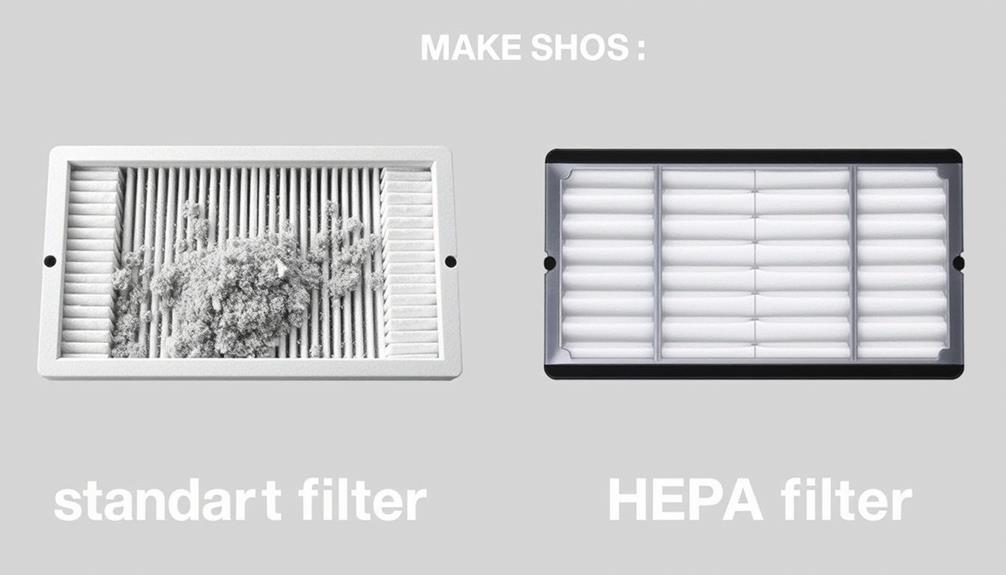
Standard filter vacuums offer a practical solution for everyday cleaning needs, effectively capturing around 80-85% of particles down to 0.3 microns with filters rated EPA E10, E11, or E12.
These vacuums strike a balance between cost-effectiveness and filtration efficiency, making them a popular choice for general household tasks. In addition, they're often recommended for maintaining general cleanliness in homes where heavy allergens aren't a major concern, as mentioned in discussions about what to look for in a home cleaning service.
While standard filter vacuums perform well for routine cleaning, they may not provide sufficient protection against allergens or fine particulate matter.
It's essential to recognize that some brands might lack specific filtration specifications, which can indicate inferior performance compared to those meeting EPA standards.
To guarantee peak vacuum performance and maintain indoor air quality, regular maintenance and timely replacement of filters are vital.
Neglecting these tasks can lead to reduced efficiency and compromised air quality in your home.
HEPA Filter Vacuums
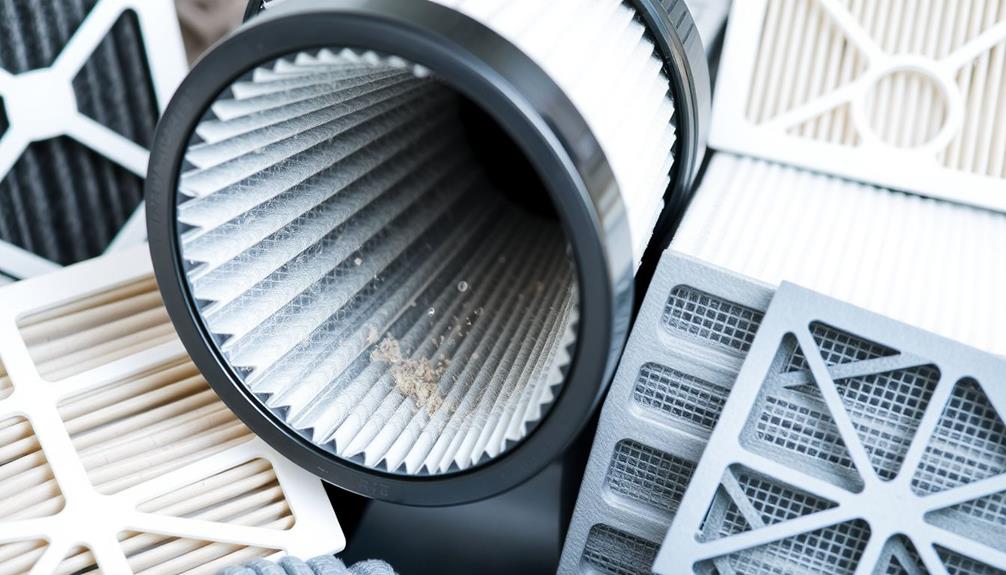
When you choose a HEPA filter vacuum, you're opting for superior efficiency in capturing tiny particles that can affect your indoor air quality.
These vacuums often incorporate advanced filtration systems that can greatly reduce allergens, dust, and other harmful particles from the air, making them an excellent choice for anyone concerned about their living environment.
To keep it performing at its best, regular maintenance and timely filter replacements are essential.
Understanding the differences in HEPA filter quality can make a considerable impact on your vacuum's effectiveness and longevity, especially when considering options like ozone air purifiers for overall air quality improvement.
HEPA Filter Efficiency
Although many vacuum cleaners claim to improve indoor air quality, HEPA filter vacuums stand out due to their exceptional efficiency in trapping microscopic particles.
If you're concerned about allergens and dust in your home, understanding HEPA filter efficiency can make all the difference. A holistic lifestyle approach, including maintaining a clean living environment, can also enhance your overall well-being and reduce allergy symptoms stress management techniques.
- HEPA filters must capture at least 99.5% of particles down to 0.3 microns.
- True HEPA filters achieve an impressive 99.97% efficiency, guaranteeing cleaner air.
- Higher-grade HEPA filters, ranging from H10 to H14, provide enhanced filtration for sensitive environments.
Using a HEPA filter considerably enhances your indoor air quality compared to standard filters, which typically capture only 80-85% of particles.
With HEPA, you're effectively trapping allergens such as dust mites, pollen, and pet dander, making your living space healthier.
The durability of True HEPA filters, often made from rugged materials like fiberglass, guarantees long-lasting performance, so you won't have to worry about frequent replacements.
To maintain ideal filtration efficiency, remember that regular maintenance and timely replacement of these filters are essential.
Maintenance and Longevity
To keep your HEPA filter vacuum performing at its best, regular maintenance is key. You should replace your HEPA filters every 6 months to 2 years, depending on how often you use the vacuum and the amount of dust in your environment. Monitoring the condition of your filters will help you maintain their filtration efficiency and guarantee peak performance.
Additionally, using a vacuum designed for pet owners, such as those featuring self-cleaning brush roll technology, can greatly reduce hair buildup and enhance suction power.
Cleaning pre-filters and dust containers can prolong the life of your HEPA filters. By preventing clogging and maintaining proper airflow, you'll enhance the overall effectiveness of your vacuum.
Using a vacuum with a sealed system is another smart move; this design prevents air leaks that could allow unfiltered air to bypass the filtration system, ultimately extending the longevity of your HEPA filters.
Investing in high-quality HEPA vacuums made with durable materials can further improve longevity and performance. When you choose a reliable model, you're guaranteeing effective air purification over time.
ULPA Filter Vacuums
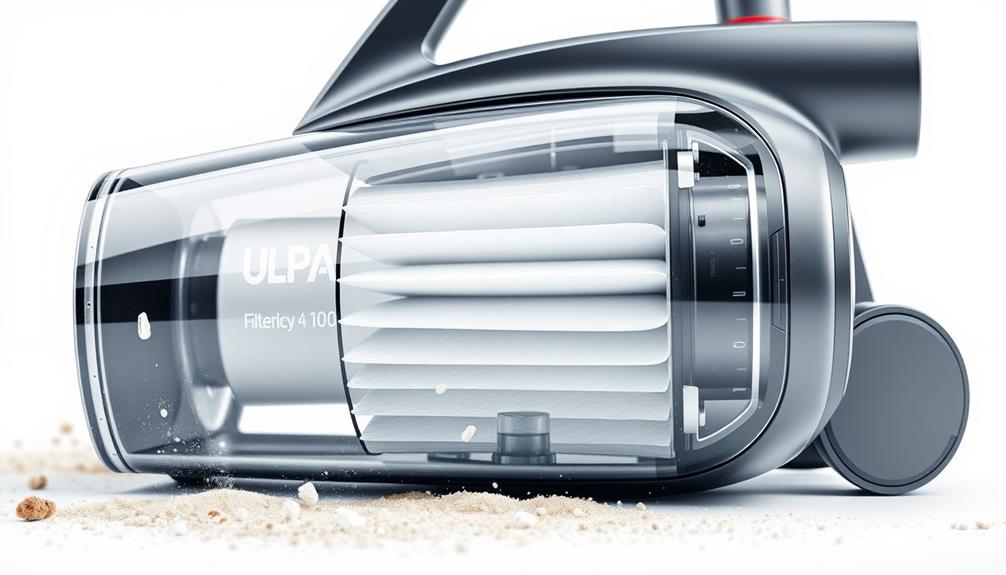
ULPA filter vacuums step up the game in air purification, offering unparalleled filtration efficiency for environments that demand the highest cleanliness standards.
These vacuums utilize ULPA filters, which remove at least 99.999% of particulate matter down to 0.3 microns. This makes them ideal for settings where even the slightest contamination poses serious risks.
In similar ways to recognizing narcissistic behaviors, understanding the filtration capabilities of ULPA vacuums is vital for ensuring optimal air quality.
- Perfect for cleanrooms and laboratories
- Essential in pharmaceutical manufacturing
- Designed for maximum air quality control
When you choose ULPA filter vacuums, you're investing in a system that prioritizes air quality.
While they tend to be more expensive due to their advanced design and high filtration capacity, the benefits are undeniable.
In industries where contaminants can lead to significant health risks or product failure, ULPA filtration is often a necessity.
Regular maintenance and timely replacement of ULPA filters are fundamental for keeping your vacuum operating at peak performance.
Filtration Efficiency Explained
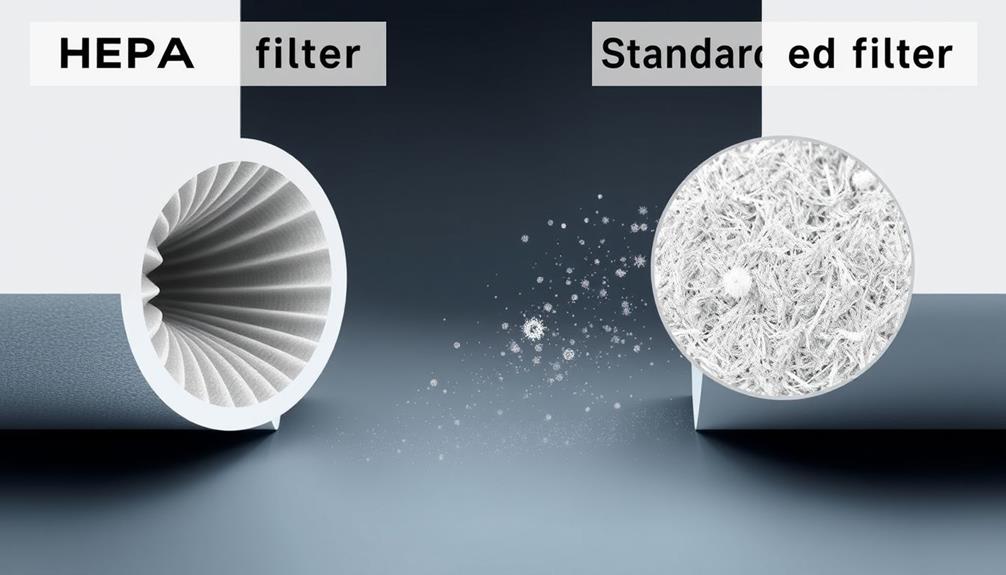
Understanding filtration efficiency is essential for choosing the right vacuum cleaner, especially if you have allergies or work in environments with strict cleanliness standards. The type of filter you choose can greatly impact your indoor air quality.
| Filter Type | Filtration Efficiency |
|---|---|
| True HEPA | 99.97% of 0.3-micron particles |
| H13 HEPA | 99.95% of 0.3-micron particles |
| ULPA | Over 99.999% of 0.3-micron particles |
HEPA filtration is widely regarded as the gold standard for capturing allergens and pollutants. True HEPA filters capture an impressive 99.97% of particles sized 0.3 microns or larger, making them a reliable choice for allergy sufferers. If you require even higher filtration efficiency, consider H13 or H14 HEPA filters, which offer 99.95% and 99.995% capture rates, respectively.
For extreme cleanliness standards, ULPA filters are your best bet, removing over 99.999% of particulate matter. By understanding these filtration efficiencies, you can make an informed decision, ensuring your vacuum cleaner meets your specific needs for air quality and hygiene.
Material Composition of Filters

The material composition of vacuum cleaner filters considerably influences their performance and efficiency. When you choose a vacuum, understanding the filter materials can make all the difference in maintaining a clean environment.
Cats, for instance, can be sensitive to dust and allergens, so selecting a vacuum with effective filtration is vital for their comfort and health, especially if they exhibit signs of stress during cleaning activities cat health and dietary considerations.
- True HEPA filters are made from durable fiberglass.
- Non-woven fabrics like polypropylene may reduce filtration effectiveness.
- The quality of materials affects longevity and performance.
True HEPA filters excel in trapping microscopic particles due to their robust construction. This is vital for allergy sufferers or anyone looking for a cleaner home.
In contrast, some vacuums use non-woven fabric filters, which can compromise effectiveness compared to true HEPA standards. If the filter material bends or degrades, you'll notice a significant drop in filtration capability.
Investing in a vacuum with quality filter media is fundamental. While true HEPA filters may come with a higher price tag, their superior materials guarantee better performance and durability over time.
Cost and Build Quality
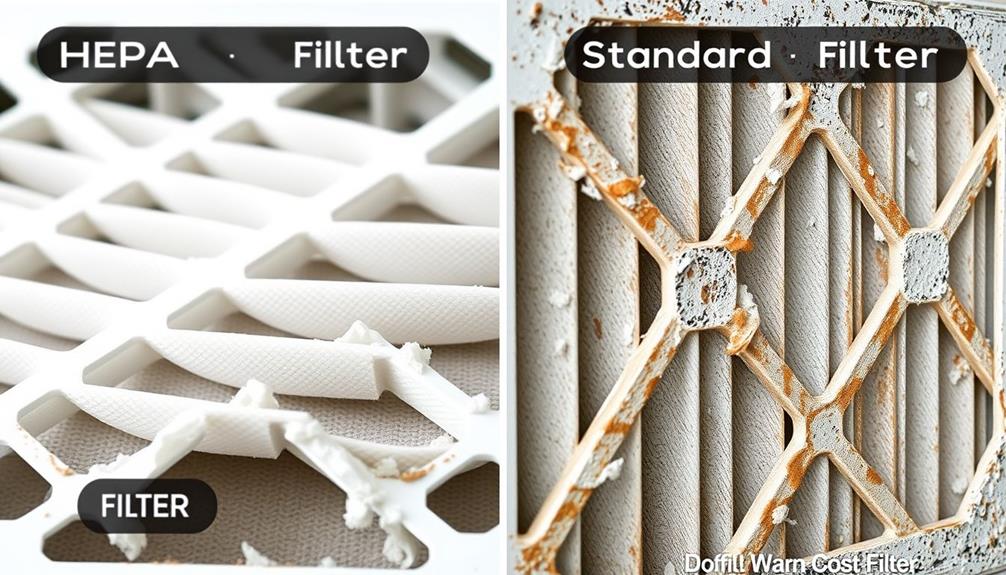
When selecting a vacuum, the cost and build quality of its filtration system play a significant role in your cleaning experience. True HEPA filters, while pricier, are worth the investment due to their rugged construction and superior materials, like fiberglass. This robust build quality guarantees longevity and consistent performance, making them a reliable choice for those serious about reducing allergens in their home.
Additionally, investing in quality filtration systems can be seen as a form of wealth preservation across generations, as they contribute to a healthier living environment for your family over time.
On the other hand, many competing vacuum brands cut costs by using lower-quality filter media. While these options might seem budget-friendly initially, they compromise filtration efficiency and overall effectiveness. A vacuum with a weaker filter may not capture allergens effectively, leading to a less clean environment.
The durable build quality of true HEPA vacuums means they're designed for long-term use, providing enhanced reliability over time. Opting for a cheaper alternative may save you money upfront, but those cost-cutting measures can lead to a less effective vacuum in the long run.
Ultimately, investing in a vacuum with a high-quality filtration system pays off by guaranteeing a cleaner, healthier living space.
Choosing the Right Vacuum
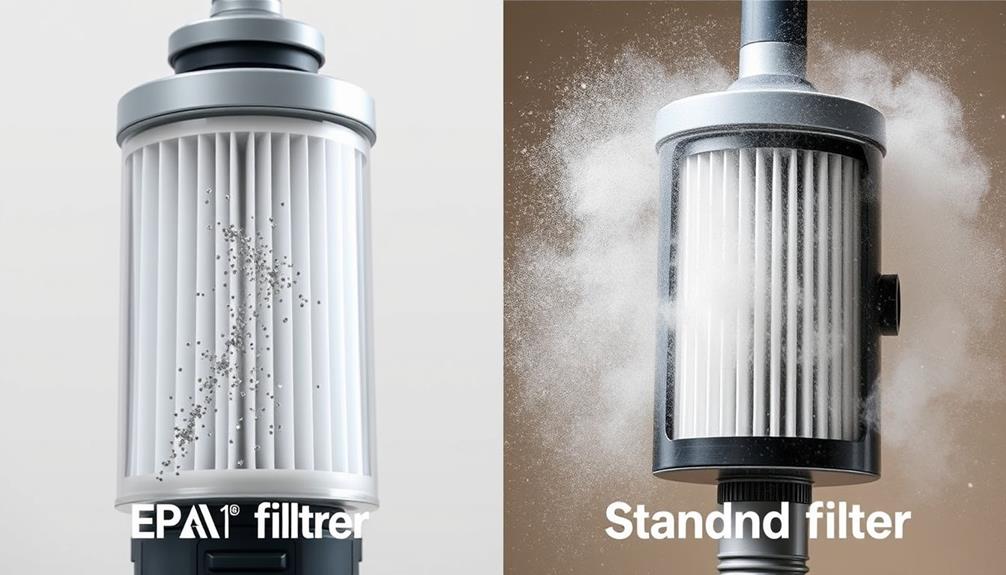
Selecting the right vacuum can greatly impact your cleaning routine and indoor air quality. When you're choosing a vacuum cleaner, consider these key factors:
- Filter effectiveness: Look for true HEPA filters that capture 99.97% of particles down to 0.3 microns. Understanding how financial responsibilities can impact your budget post-divorce may help you prioritize essential home investments.
- Filtration certification: Check for EPA ratings; H11 to H14 indicate higher HEPA standards.
- Vacuum design: Make sure it's fully sealed to prevent air leakage.
When weighing HEPA vs. other filtration systems, remember that a vacuum with a true HEPA filter greatly enhances air quality, especially for allergy sufferers.
You want a model that not only has excellent filtration but also fits your lifestyle. Evaluate the design and make sure it's fully sealed; otherwise, even the best filters will struggle to perform.
Additionally, think about maintenance—high-quality HEPA vacuums often require more frequent filter replacements to stay efficient.
Don't forget to review features like hose length, weight, and attachments, as these affect usability across different surfaces and spaces.
Maintenance and Performance
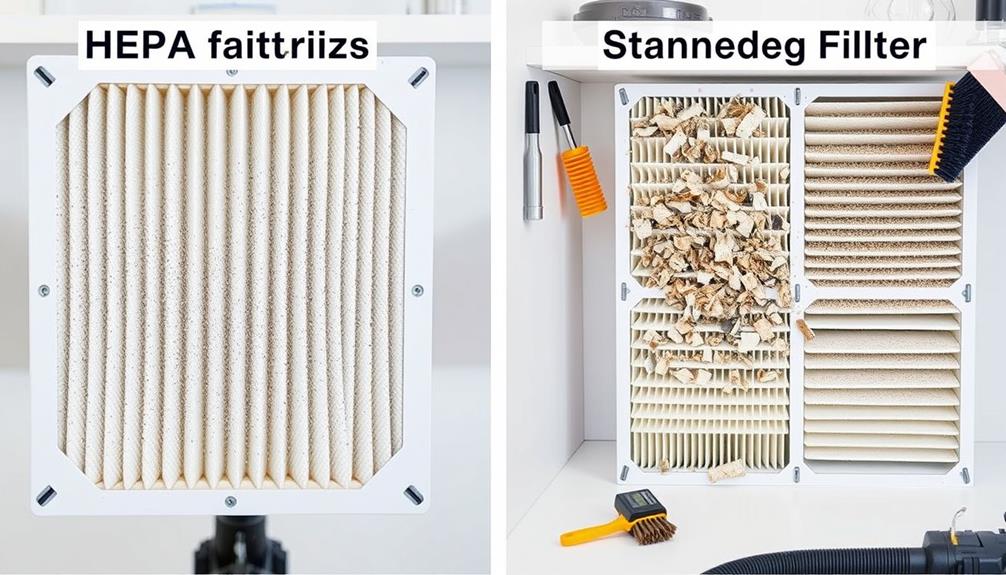
Maintaining your vacuum cleaner is vital for guaranteeing it performs at its best and effectively improves your indoor air quality.
Regular maintenance of your vacuum filters, especially HEPA filters, is essential for peak suction power and filtration efficiency. True HEPA filters capture more particles, which means they need to be replaced more frequently than standard filters. For those with indoor pets or allergies, choosing quality filters can greatly enhance air quality, making it important to take into account hair care products that suit your needs.
If filters become clogged or dirty, your vacuum's performance can suffer, leading to reduced airflow and extra strain on the motor, which can cause premature wear.
To keep your vacuum running smoothly, check your filters regularly and clean or replace them as recommended. Understanding the maintenance requirements of HEPA versus standard filters can help you maximize your vacuum's lifespan and performance.
Plus, verify that your vacuum is well-sealed; any leaks can allow unfiltered air to escape, undermining the effectiveness of the HEPA filtration system.
Impact on Indoor Air Quality
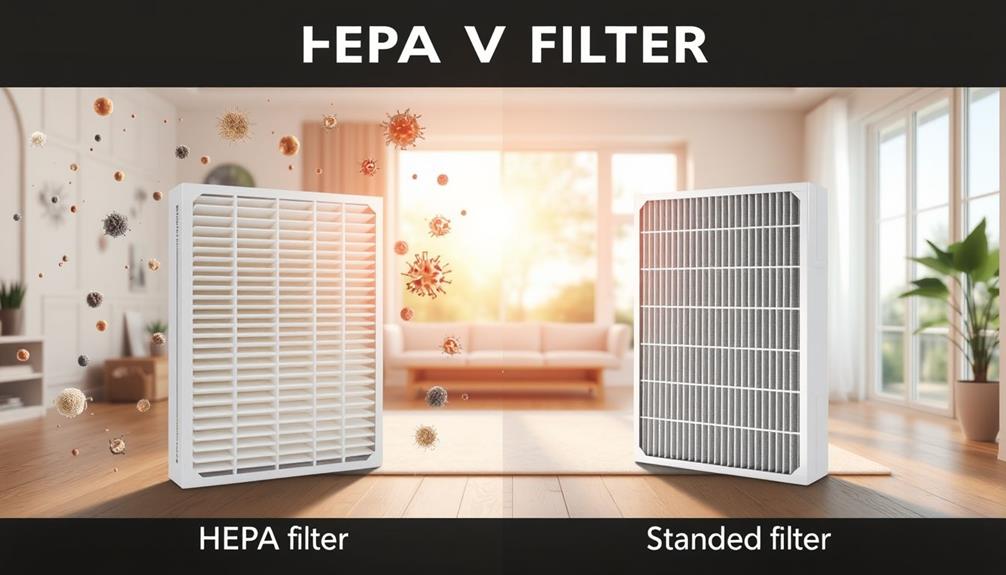
When you think about indoor air quality, the effectiveness of your vacuum's filtration system plays an essential role.
By choosing a vacuum with HEPA or ULPA filters, you can greatly reduce allergens, helping to protect your respiratory health.
Regularly maintaining and replacing these filters guarantees that your indoor environment stays clean and healthy.
Importance of Air Quality
Air quality plays an essential role in your overall health and well-being, especially indoors where you spend most of your time. Poor air quality can lead to serious health issues, making it important to invest in effective filtration systems. HEPA vacuum cleaners stand out in this regard.
- They remove at least 99.5% of airborne particles down to 0.3 microns.
- Traditional vacuum cleaners can redistribute allergens back into the air.
- Regular maintenance of filters is critical for peak performance.
Using a HEPA vacuum cleaner can greatly improve the air quality in your home or workplace. These vacuums capture and contain allergens, promoting a healthier environment, especially if you have allergy sufferers in your household.
In contrast, traditional models may inadvertently release dust and allergens, worsening indoor air quality.
To guarantee your HEPA vacuum cleaner performs at its best, remember to replace and maintain filters regularly. Clogged or worn filters can reduce effectiveness, allowing allergens to slip back into your living space.
Allergens and Respiratory Health
Since allergens can linger in your home and trigger respiratory issues, understanding their impact on indoor air quality is vital.
HEPA filters are known for their ability to trap 99.97% of airborne particles that are 0.3 microns or larger. This includes common allergens like dust mites, pollen, and pet dander, which can greatly improve your indoor environment.
Using traditional vacuums can actually worsen poor indoor air quality, as they often redistribute allergens instead of capturing them.
For individuals with asthma or allergies, opting for vacuum cleaners equipped with HEPA filters can make a remarkable difference. These systems effectively capture microscopic particles, helping to alleviate symptoms and promote better respiratory health.
The British Allergy Foundation even endorses certain vacuum cleaners that meet high filtration standards, underscoring the importance of using effective filtration systems in homes with allergy sufferers.
To maintain the efficiency of HEPA filters, regular maintenance and timely replacements are imperative. By doing so, you can guarantee continuous improvement in your indoor air quality, providing a healthier living space for you and your family.
Filtration Efficiency Comparison
Understanding the differences in filtration efficiency is vital for enhancing indoor air quality. When you choose a vacuum cleaner, the type of filter it uses can greatly impact how well it captures harmful particles.
- HEPA filters remove at least 99.97% of particles down to 0.3 microns, vastly outperforming standard filters, which typically capture only 80-85% of similar-sized particles.
- True HEPA filters, like H13 and H14, offer even greater filtration efficiency, with up to 99.995% removal of particles at 0.2 microns.
- ULPA filters go beyond HEPA standards, achieving more than 99.999% removal of particles, making them ideal for sensitive settings like healthcare and laboratories.
While HEPA filters are excellent for improving air quality, remember that filtration efficiency isn't solely about the filter type.
The vacuum's overall sealing design plays a key role too; if the seal is poor, even the best filter can fall short, allowing unwanted particles to escape.
Frequently Asked Questions
Are Vacuums With HEPA Filters Better?
Yes, vacuums with HEPA filters are better for your indoor air quality. They capture at least 99.97% of particles as small as 0.3 microns, making them ideal if you suffer from allergies.
These filters provide a higher level of filtration compared to standard ones, ensuring you don't redistribute allergens back into the air.
Is a HEPA Vacuum Better Than a Non HEPA Vacuum?
Imagine breathing in fresh mountain air after a storm—pure and invigorating.
That's what using a HEPA vacuum can feel like compared to a non-HEPA vacuum. A HEPA vacuum's ability to trap 99.97% of tiny allergens means it remarkably improves your indoor air quality.
Non-HEPA vacuums, on the other hand, might just stir up those irritants. If you want a cleaner, healthier home, a HEPA vacuum's definitely the better choice for you.
Are Some HEPA Filters Better Than Others?
Yes, some HEPA filters are definitely better than others.
You'll find that true HEPA filters can capture at least 99.97% of particles down to 0.3 microns, while others labeled "HEPA-like" may not meet those standards.
Consider the filter's grade, like H13 or H14, which indicates its effectiveness.
Also, check the materials used; higher-quality construction leads to better performance.
Regular maintenance and timely replacements are essential for maintaining maximum filtration efficiency.
Which Is Better HEPA or Foam Filter Vacuum?
When choosing between HEPA and foam filter vacuums, you'll find HEPA filters are generally the better option.
They trap at least 99.97% of particles down to 0.3 microns, making them ideal for allergy sufferers.
Foam filters, while reusable and easy to clean, often let fine particles slip through.
If you want to enhance your indoor air quality, especially with pets or allergies, investing in a vacuum with a HEPA filter is a smart choice.
Conclusion
In the grand arena of vacuum cleaners, choosing the right filtration system can feel like picking a champion to battle dust and allergens! With HEPA filters standing like superheroes in the corner, ready to capture the tiniest villains, you can't go wrong. Remember, your indoor air quality deserves the best sidekick possible. So, gear up, choose wisely, and let your vacuum become the ultimate warrior in your quest for a cleaner, fresher home! When you’re considering the best filtration system for your vacuum, it’s also important to think about the brand. Some of the best vacuum brands offer top-notch HEPA filtration, ensuring that your home is truly protected from dust and allergens. So, don’t just settle for any filtration system – aim for the best vacuum brands to ensure that your home is in the best hands possible.
